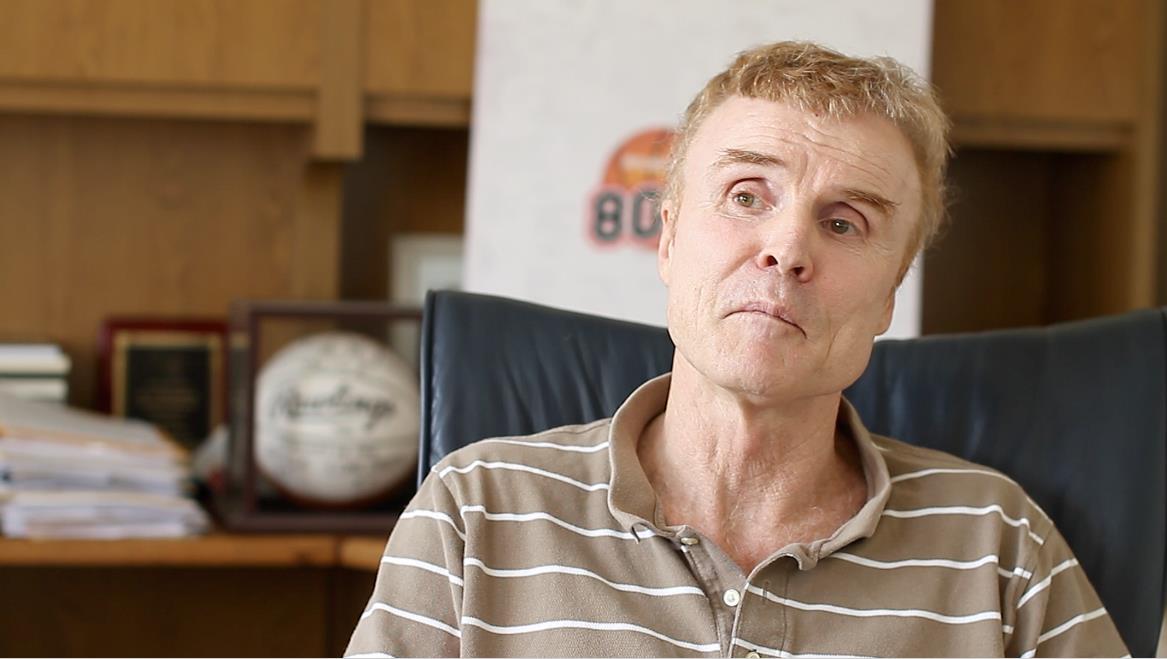Written by Conner Penfold
In an upstairs corridor of the Chase Gymnasium, at a window overlooking the soccer field and the distant La Mirada Civic Center, sits a quiet, reserved man. He presides over all Biola University athletics, and is the mind behind a flourishing men’s basketball team and its countless wins and successful seasons.
He is Dave Holmquist, an icon on campus not only for his incredible basketball achievements, but for his character, his love for the players and his love for the game.
Holmquist’s passion for basketball, and consequent successes on the court, have elevated him to a level of achievement on par with the greatest coaches of all time, including Mike Krzyzewski and Jim Calhoun. He is one of an elite class of 16 coaches in college basketball history to ever pass the milestone of 800 wins.
Yet, so few know his name, or his legacy.
To Holmquist, however, his career’s lack of recognition is of little concern.
“If you’re a small college, whether that be. . . NAIA or NCAA Division III, you’re not going to get nearly as much exposure as the Division I people,” Holmquist says. “But there’s a lot of good things that go with that.”
Holmquist is especially grateful for the quality time he spends with his players, a blessing he has enjoyed since his basketball beginnings.
The Road to Greatness
Though he was born in Minnesota, Holmquist spent his childhood in the greater Los Angeles area. He was raised in Whittier, Buena Park and Fullerton, alongside two younger siblings, by parents who relished watching him thrive in his love for basketball.
“My parents really enjoyed it, especially my dad,” Holmquist says of his father, who passed away when Holmquist was 30 years old. “He really enjoyed coming to games as I grew up, watching me play and then watching me coach. My mom doesn’t really know much about basketball, but she’s always been real supportive.”
A Biola alumnus, Holmquist first attended nearby Cypress College, where he played basketball as a Charger for two seasons before transferring to Biola. His senior season with the Eagles proved to be a special one, as he was named team captain and began working towards his future as a coach.
“I felt that as a coach, you can have a special relationship with people that you coach and build friendships that will really last a long time,” Holmquist says. “I just couldn’t think of anything that would be more interesting to me than coaching, plus I wanted to be in a college environment.”
Pursuing his Coaching Career
Holmquist wasted no time in pursuing these aspirations. Following his graduation in spring of 1973, Holmquist immediately joined the Biola staff, working alongside his own former coach, Howard Lyon. He spent two years as the assistant coach before heading north to accept the head coaching position at Fresno Pacific College.
After three years in Fresno, Holmquist returned to his alma mater in the fall of 1978, where he joined Lyon as co-head coach for nine seasons. They shared NAIA Coach of the Year honors following an incredible 1982 season, when they led the Eagles to a remarkable 39-1 record, only to lose in the finals to Tennessee Temple University.
However, the Eagles under Lyon and Holmquist would go on to win the NAIA championship in 1984, earning the university’s third title.
Holmquist took over as the sole head coach in the fall of 1988, a year after earning NAIA Coach of the Year honors with Lyon for a second time. He inherited a talented squad that had lost only seven games over the previous two seasons combined.
Holmquist Sets Impressive Records
The Eagles have won 20 or more games in 18 seasons since Holmquist took over, and his career victory count before the 2011 season has reached 816, a number surpassed by only a few legendary figures.
Holmquist has entered his 32nd season as head coach, and sees no end in sight. “I’m still enjoying it,” he says. “I’ve always taken games one at a time, and the same with seasons, so as long as my health is OK, I’d like to keep [coaching].”
Holmquist is now the longest tenured head coach in the Golden State Athletic Conference, and one of only 40 college coaches to ever coach more than 1,000 games.
The 2012 season marked another milestone for Holmquist, as he led a roster full of transfers and freshmen to the program’s first ever GSAC Tournament title, knocking off highly ranked Concordia University in the finals to establish the feat.
Still, it is the time he spends in fellowship with his players, both current and former, that has created some of Holmquist’s fondest memories. Of course, few can compare to the night of Dec. 29, 2010, where in front of a home crowd at Chase Gymnasium, the Eagles defeated Fraser Valley University of British Columbia to earn Holmquist his 800th career win, securing his spot on an exclusive and legendary list.
Multiple Degrees Aid Coaching Prowess
Though his knowledge of the game is immense — his résumé speaks for itself — many are unaware of Holmquist’s extensive academic credentials.
After graduating from Biola with a Bachelor of Arts in Physical Education, Holmquist decided to pursue additional schooling, receiving six supplementary degrees at four separate universities. He received five Master’s degrees: Physical Education and History from California State University-Fullerton, Marriage Family and Child Counseling and Theology from Biola, and Philosophy from California State University-Long Beach. He topped it off with a Doctorate degree in Physical Education from the University of Southern California.
Though he indicates his extensive knowledge in physical education would surely benefit his coaching ambitions, his reasons behind the additional schooling point toward a passion for learning.
“When I decided I wanted to be a coach, I wanted to pursue the degrees that would fit with that choice,” says Holmquist. “But then I wanted to study other areas that didn’t necessarily apply to what I was doing in my profession but that I enjoyed.”
But he still believes the extent of it has a purpose ultimately geared towards coaching.
“I think it has helped me as a coach because part of what a coach should do is emphasize education and what it means to be a lifelong learner,” Holmquist explains. “And so by learning different things along the way I’ve been able to talk to my players and hopefully have encouraged them to pursue learning a little bit more.”
Holmquist’s multiple passions have shaped him into the groundbreaking coach he is today; a man that strives for success for his players on and off the court.
“That’s the joy of coaching; it’s the relationships and what comes out of that that really makes it meaningful,” he says.





